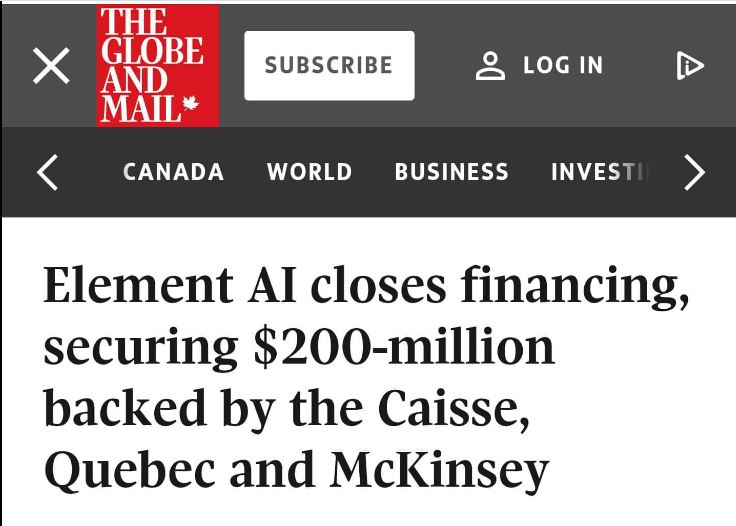
Element AI closes financing, securing $200-million backed by the Caisse, Quebec and McKinsey
This article was published more than 1 year ago. Some information in it may no longer be current.
However, unlike most startups fortunate to attract that level of capital, the latest financing is not a mark of the Montreal-based company’s commercial success. Rather, it is driven by investors – notably pension giant Caisse de dépôt et placement du Québec – intent on reversing Element’s disappointing performance to date, by bringing some much-needed discipline to its operations and shifting its strategic focus, sources familiar with the deal told The Globe and Mail. The sources were granted anonymity because they were not authorized to speak publicly about the deal.
“Operationalizing AI is currently the industry’s toughest challenge, and few companies have been successful at taking proofs-of-concept out of the lab, imbedding them strategically in their operations and delivering actual business impact,” Element’s chief executive and co-founder Jean-Francois Gagné acknowledged in a statement. He added the new investors “understand this challenge well.” The company declined an interview request.
The deal sees Element raise US$151.4-million from a group led by the Caisse, the Quebec government and global management-consulting giant McKinsey & Co., whose advanced analytics and AI division QuantumBlack opened a Montreal office nine months ago. Quebec Economy and Innovation Minister Pierre Fitzgibbon told The Globe last month the Caisse and province were putting up US$75-million and US$25-million, respectively, and provided additional information that suggested the company would be valued at up to US$625-million. McKinsey invested approximately US$15-million, said a source familiar with the deal.
The financing comes two years after Element secured US$102-million from global investors, months after its much-hyped launch by a group of Montrealers including deep learning pioneer Yoshua Bengio and Mr. Gagné.
Element has positioned itself as the champion of a flourishing AI sector in Montreal that both the provincial government and Caisse have been keen to support.
The company set out on a global search in June, 2018, to raise US$250-million to fund its development of AI-powered software intended to help bring operational improvements to a range of industries. In the end, a deal came together with the help of institutions in its own backyard after the provincial cabinet deemed the startup to be “of significant economic interest to Quebec.”
The funding comes after several setbacks for Element in getting products to market, after a torrid hiring spree that saw it grow its ranks to more than 500 people before proving there was substantial commercial interest in its offerings. The company generated less than US$10-million in revenue last year, primarily from consulting contracts. By contrast, Ottawa e-commerce software provider Shopify Inc. only reached the 500-employee mark the year it hit US$100-million in revenue.
Element’s aggressive recruitment raised the ire of other local AI companies, which complained Element was recklessly draining the market of talent. The company has shed several executives in recent months.
Mr. Fitzgibbon told The Globe last month Element had undertaken “a lot of soul searching” recently, adding, “There is some adjustment required, [and] we’ll be tightly monitoring them.” He said Element needed to focus on promising applications, adding large customers and working in a “proper partnership with the shareholders … to bring outside resources to influence the strategy.
Sources familiar with the deal said Caisse officials disagreed with the company’s expensive strategy of hiring massively before reaching commercial success. But they also believed Element could still succeed with the talent it had amassed and technology it had built by developing software to solve customer problems using AI tools in a couple of sectors with high potential, notably insurance and supply chain logistics.
The Globe also learned the Caisse, one of Canada’s largest fund managers and a heavy backer of domestic tech startups, only agreed to invest after protracted negotiations over such matters as veto and governance rights for all major investors, in part related to the company meeting certain performance targets, as is the case with other venture deals.
Its involvement was also contingent upon attracting a credible strategic investors, which the Caisse found in McKinsey.
The deal is also a high-profile test for the Caisse. The Caisse has a government-set dual mandate to support Quebec’s economic development and deliver investment returns, which at times in its history has led to ill-fated, politically charged investment decisions. In recent years, the Caisse has established itself as a leading financier of Canadian tech firms driven by a methodical approach whereby it finances top performing startups backed by Canadian venture funds it supports. Backing Element is a departure, as the Caisse effectively funds a turnaround, not a growth story.
“With this transaction, we are investing capital and expertise alongside partners who are ideally suited to transform Element AI into a company with a commercial focus that anticipates and creates AI products to address clients’ needs, » Charles Émond, the Caisse’s executive vice-president and head of Québec investments and global strategic planning, said in a release.
Your time is valuable. Have the Top Business Headlines newsletter conveniently delivered to your inbox in the morning or evening. Sign up today.

La vente d’Element AI à une firme américaine suscite la grogne

La vente à une entreprise californienne de la jeune pousse montréalaise d’intelligence artificielle Element AI, cofondée par le chercheur Yoshua Bengio, suscite la grogne dans l’industrie québécoise des technologies. Des employés auraient déjà été mis à pied à Montréal, selon les informations obtenues par Le Devoir.
« Nous nous engageons à assurer une transition en douceur pour les employés licenciés. Nous ne divulguons pas le nombre d’employés qui sont remerciés », a indiqué au Devoir la porte-parole de ServiceNow, Sara Day.
Le développeur de logiciels californien ServiceNow a annoncé lundi qu’il mettait la main sur ce fleuron québécois de l’intelligence artificielle. La transaction sera officialisée au début de la prochaine année. Le chercheur Yoshua Bengio agira à titre de conseiller technique pour ServiceNow.
Element AI développe depuis sa création en 2016 des solutions pour éliminer des tâches répétitives grâce à des systèmes informatiques capables de s’améliorer eux-mêmes. Ses technologies sont entre autres destinées aux secteurs de la cybersécurité, de l’assurance, de la finance ainsi que de la logistique.
Le montant de la transaction n’a pas été dévoilé. Le site d’information TechCrunch cite des sources qui estiment la valeur de celle-ci à près de 500 millions de dollars américains. Lors de sa dernière ronde de financement, en septembre 2019, la valorisation de l’entreprise montréalaise gravitait plutôt entre 600 et 700 millions de dollars.
Element AI a notamment bénéficié du soutien du gouvernement québécois ainsi que de celui de la Caisse de dépôt et placement du Québec, qui a injecté des dizaines de millions de dollars dans son développement.
« Une triste nouvelle »
C’est d’ailleurs ce qui fait réagir dans l’industrie. Le Devoir s’est entretenu avec des acteurs du secteur, dont des dirigeants de jeunes pousses de Montréal et des représentants sectoriels. Aucun n’a voulu commenter publiquement la transaction.
Or, ils estiment tous que cette vente représente l’échec du gouvernement dans le financement de l’intelligence artificielle. « Les millions qui ont été investis vont finalement bénéficier à une entreprise étrangère et les sommes n’auront pas aidé d’autres entreprises en intelligence artificielle », résume l’un d’eux.
Le p.-d.g. de Numana (anciennement TechnoMontréal), François Borrelli, concède que la question du financement public est délicate dans le secteur : « Est-ce qu’investir directement dans plus d’entreprises en intelligence artificielle aurait été davantage bénéfique ? La question se pose. » L’acquisition est « une triste nouvelle », poursuit-il. « Element AI était perçue comme une entreprise autour de laquelle un écosystème aurait pu se développer. Il y a quelque chose de symbolique avec cette acquisition. »
« On souhaite maintenant qu’il n’y ait pas d’exode des talents, et il y a aussi la question de pertes de propriétés intellectuelles qui accompagne ce type de transaction », ajoute-t-il.
L’acquisition a aussi trouvé écho dans la sphère politique. La cheffe du Parti libéral du Québec, Dominique Anglade, estime qu’avec cette vente, « tout le monde perd : les start-ups qui n’ont pas été financées et nous, parce qu’on a investi de l’argent qui part à l’étranger ». Elle avance que le rôle du gouvernement, « c’est d’encourager le secteur sans mettre tous ses œufs dans le même panier ».
Son de cloche similaire de la part du critique en matière de justice fiscale de Québec solidaire, Vincent Marissal : « Est-ce que la Caisse de dépôt et placement a pris des moyens pour garder l’entreprise ici ? Sinon, on sombre dans le syndrome de la start-up : deux gars qui inventent une application et qui la vendent quatre ans plus tard pour plusieurs millions de dollars à un géant américain. »




